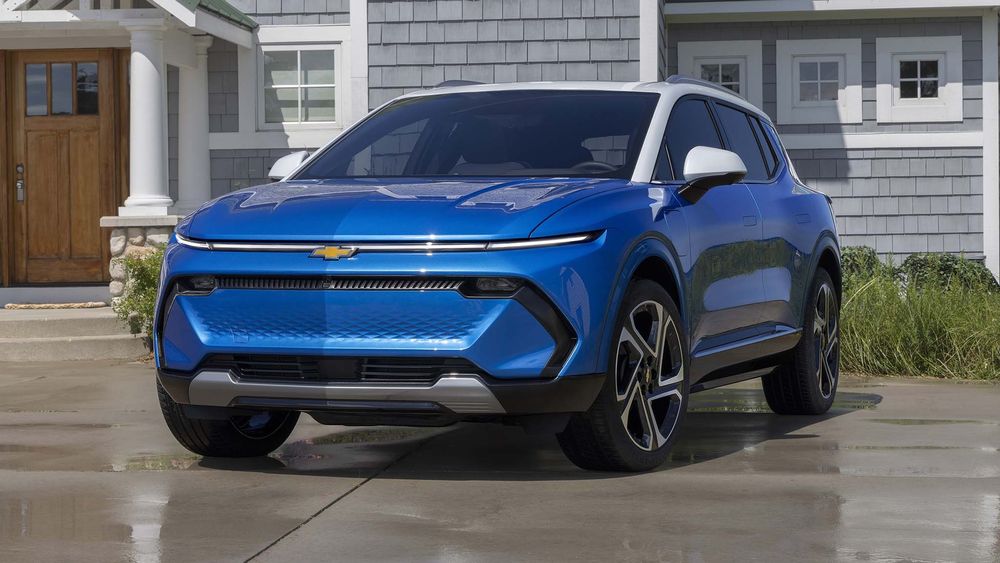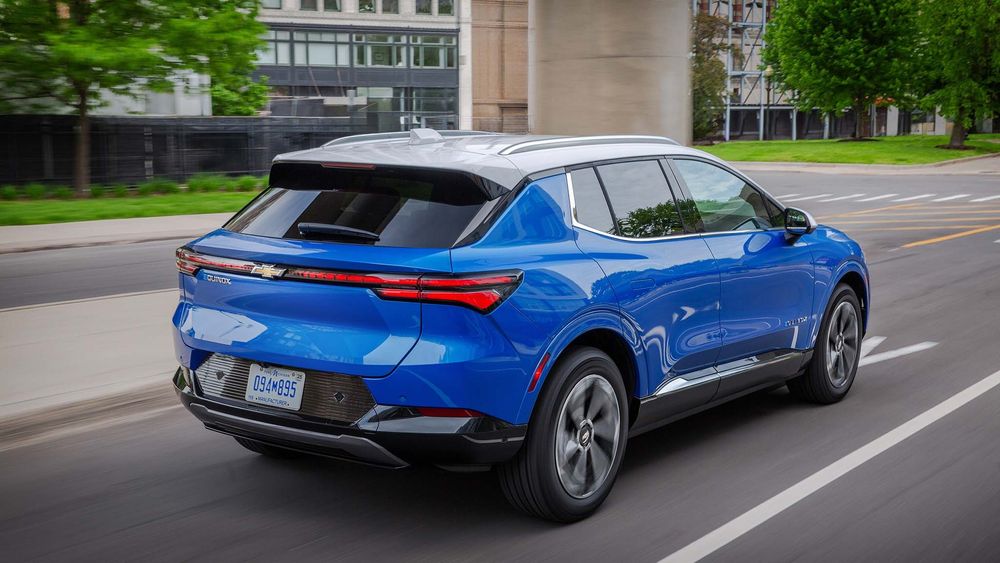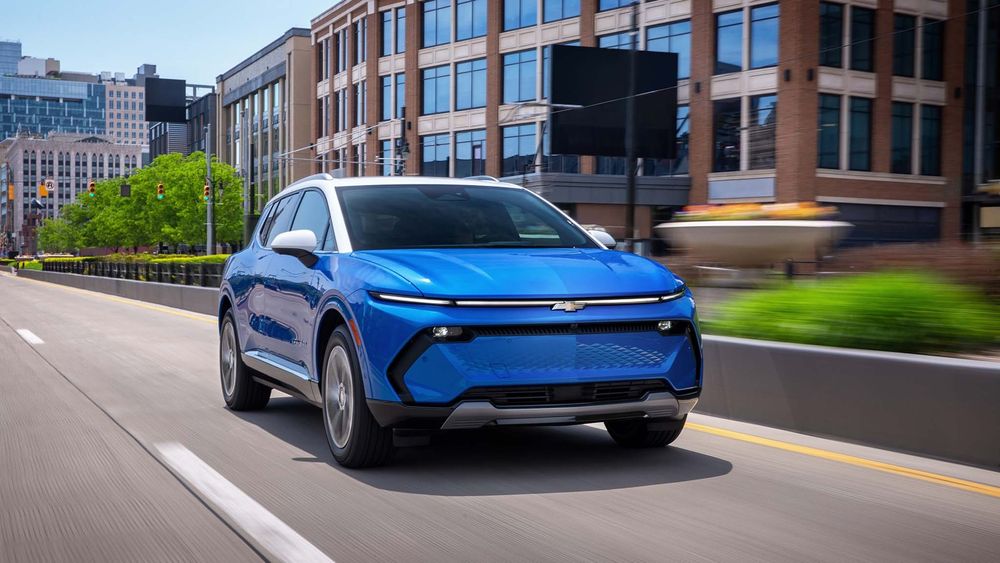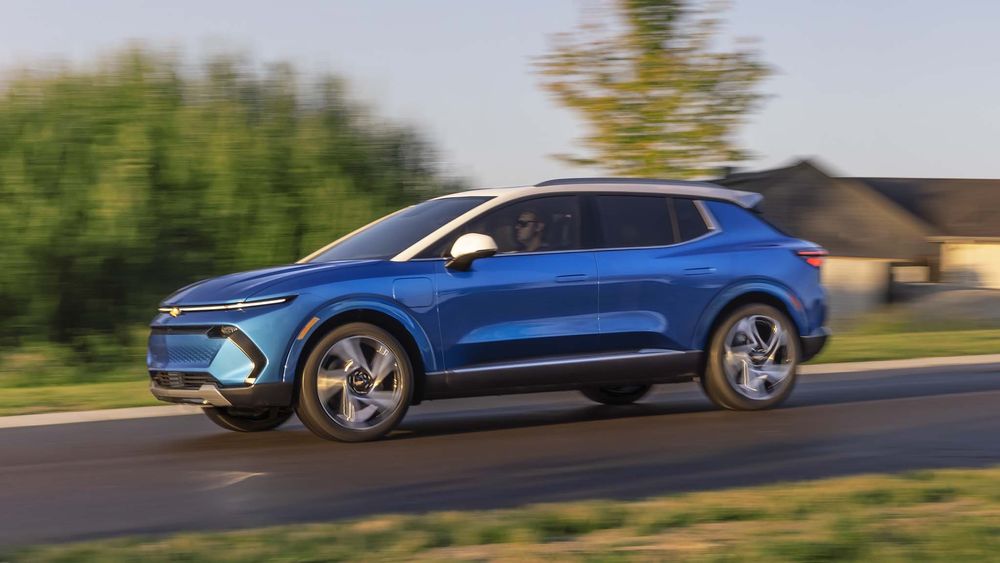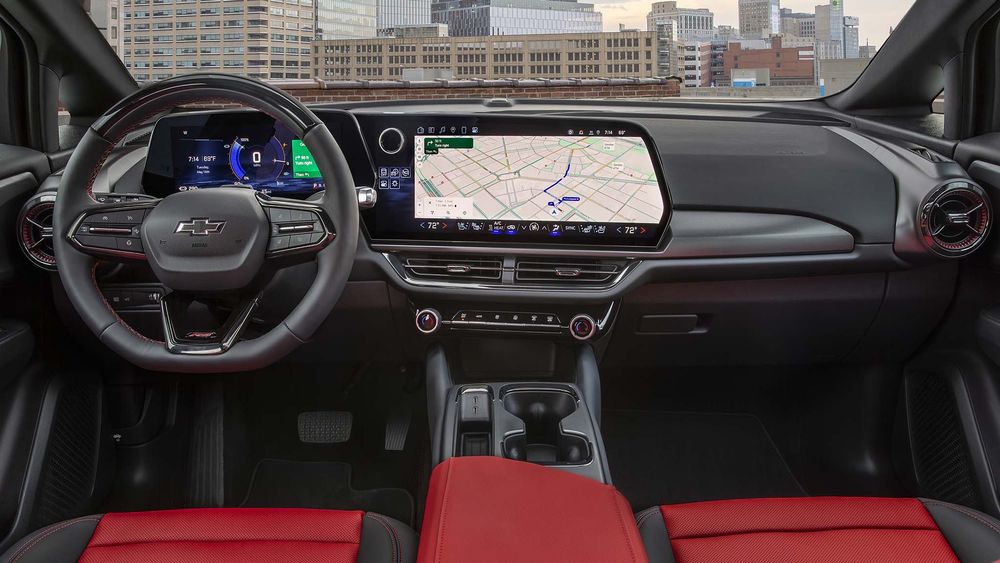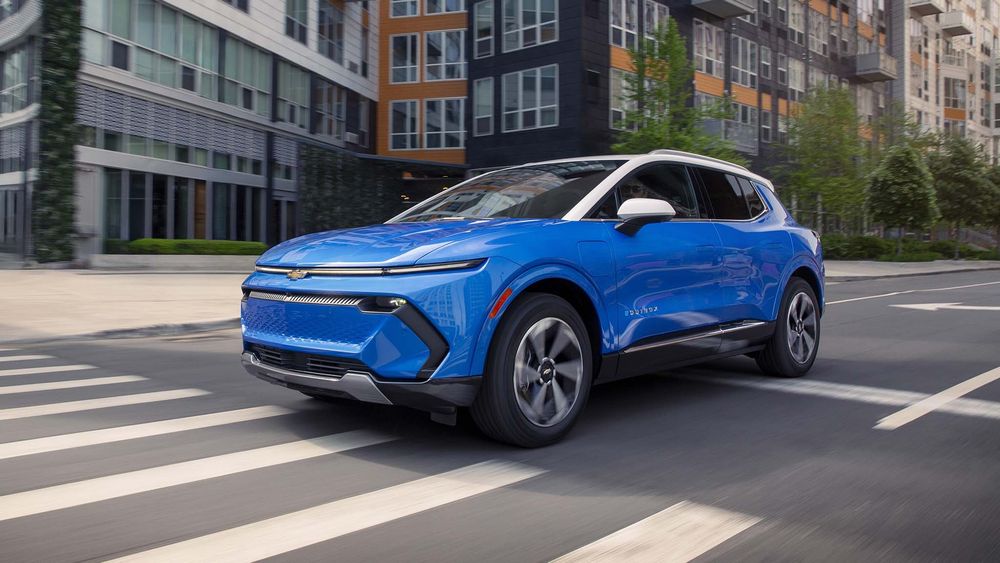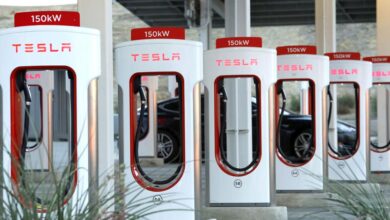The 2024 Chevrolet Equinox EV Fixes (Nearly) Everything the Cheap Bolt Got Wrong

You can’t talk about the $34,995 2024 Chevrolet Equinox EV without also talking about the 2023 Chevy Bolt EV, which stickered for just $26,595 when GM shut down production this past December. We bring up the recently departed Bolt not to undermine Chevy’s new electric compact SUV but to point out that Americans have had access to cheap EVs before now. Chevy even sold an electric car for less than $20,000 after the federal tax credit way back in 2013. No one wanted it—that was the Spark EV— because it had the toylike proportions of a Little Tikes Cozy Coupe and ran out of juice after just 82 miles.
The challenge for Chevy then wasn’t just to make the Equinox EV cheap. The challenge was to make an affordable EV that the compact-crossover-driving masses actually want. Based on our day behind the wheel, it looks like Chevy has almost nailed the brief. While it isn’t without compromise, the Equinox EV has the space, style, driving experience, and range (up to 319 miles) to go with an attractive price to push EVs further into the mainstream.
The Fine Print
Before we get to how the Equinox EV drives, let’s talk about that price, because we can already hear keyboards being mashed in the distinct cadence of outrage. Don’t get hung up on the fact that a $35,000 Equinox is about 30 percent more expensive than a Bolt. Every Equinox EV will be eligible for a federal tax credit of up to $7,500, which can now be claimed at the time of purchase to lower your monthly payment. At an effective price of $27,495, the Equinox is a vastly better vehicle than the Bolt even if that car was eligible for the same government perk.
That said, we also have to disclose that we’re making some assumptions about how a $35K Equinox compares to a $27K Bolt. We haven’t yet driven the base Equinox EV 1LT or even seen it in person, so there’s still a chance it shows up with milk crates for seats and a dashboard made of compressed cat hair. The price-leader Equinox “will be available for ordering later in the year,” according to Chevy, which implies deliveries won’t happen before 2025.
The Equinox EV You Can Buy Today
For the moment, the entry model—the cheapest Equinox EV available—is the 2LT, priced from $43,295 (or $35,795 after Uncle Sam’s discount). We drove two midlevel trims optioned to about $47,000 before tax credit and came away with a clear preference for one over the other.
Our drive started from downtown Detroit in a front-wheel-drive 2RS model, which comes standard with 21-inch wheels and red interior accents for a sportier appearance without a sportier driving experience. Chevy has set up the LT and RS lines to give buyers two looks with similar equipment and driving behavior. In any trim, front-wheel-drive models make 213 horsepower and 236 lb-ft of torque—enough to feel torque steer tugging at the steering wheel during foot-to-the-floor acceleration but not enough to feel any excitement in your chest. Chevy claims a leisurely 8.0-second 0–60-mph time, throwing a wet blanket on the idea that all EVs are quick. (The front-drive Bolt made the run in less than 6.5 seconds.)
If that’s not quick enough for you, you’ll have to drum up $3,300 for all-wheel drive, which adds a rear motor that raises total output to 288 horsepower and 333 lb-ft of torque and drops Chevy’s advertised 0–60 time to 5.9 seconds. The advantage here is less about the numbers and more about the experience. The second motor gives the eAWD Equinox the swift, authoritative acceleration we’ve come to expect and love in EVs. It also helps quell the torque steer.
We sampled the all-wheel-drive powertrain in a 2LT, which is your last chance for 19-inch wheels before being “upgraded” to 21-inch rolling stock in 2RS, 3LT, and 3RS trims. If you live somewhere with crappy roads, this is the Equinox you want. The smaller wheels are wrapped in taller tires that take the sharp edge off hard impacts and do a better job smoothing out those Midwestern roads that, after years of repairs, are just one giant patch. On most streets, the stiffer 21-inchers ride just fine, but hit a raised sewer cover or bumble over choppy pavement, and you’ll feel and hear it more than you’d like.
In corners, the Equinox EV drives with the basic competence and indifference of pretty much every other compact crossover—gas, electric, or hybrid. The steering is accurate without being quick, and the ride is comfortable but not cosseting. It’s not sporty, nor is it soft. The low center of gravity gives it less body roll than your average Toyota RAV4, but otherwise the experience is unremarkable. Considering that’s par for the segment, most buyers should feel right at home.
Long, Slow Distance
The auto industry has developed a bad habit of advertising a big range number and a low price while making it impossible to get both at the same time. Chevy runs against the current by equipping every Equinox EV with an 85-kWh battery. That means the $34,995 1LT will earn the same 319-mile EPA range that applies to all front-wheel-drive Equinox EVs. All-wheel-drive models are rated for 285 miles across the board.
That should be more than adequate for most buyers. Road warriors, however, will have to reckon with the Equinox’s modest fast-charging capabilities. At a peak of 150 kilowatts, the Equinox is only fast to charge compared to a Bolt, which maxed out at a measly 50 kilowatts. Competitors like the Kia EV6 and the Hyundai Ioniq 5 can top 230 kilowatts, and the Tesla Model Y will hit 250. To put that in context, Chevy claims an Equinox EV adds 77 miles after 10 minutes of charging. In MotorTrend’s real-world testing, the Tesla adds nearly twice that range—140 miles—in the same time.
The Secret to Making a Cheaper EV
GM loves to remind us the Ultium electric powertrain tech powering the Equinox EV was dreamed up to bring EV costs down through economies of scale. That might prove true in the long run, but for the moment the company also has to rely on a few old-fashioned cost-cutting measures to get Equinox prices within reach of the gas competition.
That’s most obvious from inside the Equinox EV, which—like the car as whole—is an interesting combination of advanced technology and not-so-subtle penny pinching. The crystal-clear standard 11.0-inch digital cluster and 17.7-inch infotainment would be impressive at any price point, and the optional $2,100 Super Cruise hands-free driver assistance system feels like magic as it changes lanes to pass slower traffic on the highway without driver input. It’s also possible to wire your house so that your Equinox acts as a backup battery during power outages, though you’re almost certainly going to spend more than $10,000 for the necessary equipment and installation.
But if you spend $40,000 on a gas compact crossover, you can expect to get every butt-cooling, palm-warming, scalp-toasting feature you could want. In the Equinox EV, you can spend that much (after the tax rebate) and still not get all-wheel drive, a sunroof, or even dual-zone climate control. The Equinox also doesn’t support Apple CarPlay and Android Auto, and you’ll eventually have to pay GM a data service fee to use downloadable streaming apps like Spotify and even the basic Google Maps navigation.
Apart from abandoning CarPlay and Android Auto, Chevy spent and scrimped in the right places. Even if we’re not yet at true cost-equipment parity for EVs and combustion vehicles, the Equinox EV offers a package similar to a Toyota RAV4 at a similar price. It helps that Chevy got the basic dimensions of this car right. Critically, the Equinox EV measures 7.2 inches wider and 21.1 inches longer than the SUV-adjacent Bolt EUV model (which itself was bigger than the more carlike Bolt EV). That helps it look low and planted even though it’s taller than the awkwardly narrow and upright Bolt EUV. Inside, the extra shoulder and hip width give the cockpit a sense of spaciousness, and cargo space behind the rear seats is up more than 60 percent to 26.4 cubic feet.
A Better Bolt
The Chevy Equinox EV enters the market at the exact right moment. As price concerns start to dominate the conversation around EVs, the Equinox makes smart compromises to deliver the range and interior space compact crossover buyers expect without watering down the value equation. There’s still more work to be done before EVs can replace a gas vehicle at the same cost and with the same equipment, but you can take the Equinox EV as proof that Chevy is making progress toward that goal.
